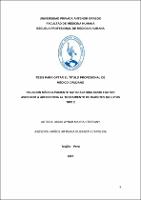Mostrar el registro sencillo del ítem
Relación médico-paciente satisfactoria como factor asociado a adherencia al tratamiento de diabetes mellitus tipo 2
| dc.contributor.advisor | Muñoz Arteaga, Elizabeth Carolina | |
| dc.contributor.author | Arias Aybar, Mayra Steffany | |
| dc.creator | Arias Aybar, Mayra Steffany | |
| dc.date.accessioned | 2020-03-05T12:25:32Z | |
| dc.date.available | 2020-03-05T12:25:32Z | |
| dc.date.issued | 2020 | |
| dc.identifier.uri | https://hdl.handle.net/20.500.12759/6054 | |
| dc.description.abstract | Determinar si la relación médico-paciente satisfactoria es un factor asociado a la adherencia al tratamiento farmacológico en pacientes con diabetes mellitus tipo 2 en dos Hospitales de Trujillo. Material y métodos: Se realizó un estudio observacional, analítico, transversal. La muestra estuvo constituida por 381 pacientes con diabetes mellitus tipo 2 de dos Hospitales de Trujillo, que cumplieron con los criterios de selección, durante el periodo Junio-Noviembre del 2018. Se aplicó el Cuestionario PREMEPA para evaluar la calidad de la relación médico-paciente y la MMAS-8 para evaluar la adherencia al tratamiento farmacológico de diabetes mellitus tipo 2. Resultados: La proporción de adherencia al tratamiento farmacológico de diabetes mellitus tipo 2 fue de 24,6% y de relación médico-paciente satisfactoria fue de 77,1%. Se encontró asociación entre la relación médico-paciente satisfactoria y la adherencia al tratamiento de diabetes mellitus tipo 2 (p= 0,001; OR=0,284; IC 95% [0,136-0,591]). La proporción de relación médico-paciente satisfactoria en el grupo con adherencia al tratamiento farmacológico de diabetes mellitus tipo 2 fue de 90,4 %, mientras que en el grupo sin adherencia al tratamiento de diabetes mellitus tipo 2 fue de 72,8%. La edad promedio de los pacientes con adherencia al tratamiento farmacológico de diabetes mellitus tipo 2 fue 61,34 + 2,36 años. El análisis bivariado mostró que el menor régimen de medicamentos diarios (1 vez al día) y el no tener complicaciones crónicas están asociados significativamente a adherencia al tratamiento de diabetes mellitus tipo 2. El análisis multivariado identificó a la relación médico-paciente satisfactoria y menor régimen de medicamentos diarios (1 vez al día) como factores asociados a adherencia al tratamiento farmacológico de diabetes tipo 2. Conclusiones: La relación médico-paciente satisfactoria y el menor régimen de medicamentos diarios (1 vez al día), son factores asociados a la adherencia al tratamiento farmacológico en pacientes con diabetes mellitus tipo 2 en dos Hospitales de Trujillo durante el periodo junio-noviembre del 2018. | es_PE |
| dc.description.abstract | To determine if the satisfactory doctor-patient relationship is a factor associated with adherence to drug treatment in patients with type 2 diabetes in two Hospitals from Trujillo. Material and methods: An observational, analytical, cross-sectional study was carried out. The sample consisted of 381 patients with type 2 diabetes of two Hospitals from Trujillo during June-November 2018, which met the selection criteria. The PREMEPA Questionnaire was applied to assess the quality of the doctor-patient relationship and MMAS-8 to assess adherence to the pharmacological treatment of type 2 diabetes. Results: The proportion of adherence to the pharmacological treatment of type 2 diabetes was 24.6% and the satisfactory doctor-patient ratio was 77.1%. An association was found between the satisfactory doctor-patient relationship and adherence to the treatment of type 2 diabetes mellitus (p = 0.001; OR = 0.284; 95% CI [0.136-0.591]). The proportion of satisfactory doctor-patient relationship in the group with adherence to the pharmacological treatment of type 2 diabetes was 90.4%, while in the group without adherence to the treatment of type 2 diabetes mellitus was 72.8%. The average age of patients with adherence to the pharmacological treatment of type 2 diabetes was 61.34 + 2.36 years. The bivariate analysis showed that the lower regimen of daily medications (once a day) and doesn’t have late complications are significantly associated with adherence to the treatment of type 2 diabetes mellitus. The multivariate analysis identified the satisfactory doctor-patient relationship and the lowest regimen of daily medications (once a day) as factors associated with adherence to the pharmacological treatment of type 2 diabetes. Conclusions: The satisfactory doctor-patient relationship and the lower daily medication regimen (once a day) are factors associated with adherence to drug treatment in patients with type 2 diabetes mellitus in two Hospitals from Trujillo during June-November 2018. | en_US |
| dc.description.uri | Tesis | es_PE |
| dc.format | application/pdf | |
| dc.language.iso | spa | es_PE |
| dc.publisher | Universidad Privada Antenor Orrego | es_PE |
| dc.relation.ispartofseries | T_MED.HUMA_2727 | |
| dc.rights | info:eu-repo/semantics/openAccess | es_PE |
| dc.source | Universidad Privada Antenor Orrego | es_PE |
| dc.source | Repositorio Institucional - UPAO | es_PE |
| dc.subject | Relación médico-paciente | es_PE |
| dc.subject | Adherencia al tratamiento farmacológico | es_PE |
| dc.title | Relación médico-paciente satisfactoria como factor asociado a adherencia al tratamiento de diabetes mellitus tipo 2 | es_PE |
| dc.type | info:eu-repo/semantics/bachelorThesis | es_PE |
| thesis.degree.level | Título Profesional | es_PE |
| thesis.degree.grantor | Universidad Privada Antenor Orrego. Facultad de Medicina Humana | es_PE |
| thesis.degree.name | Médico Cirujano | es_PE |
| thesis.degree.discipline | Medicina Humana | es_PE |
Ficheros en el ítem
Este ítem aparece en la(s) siguiente(s) colección(es)
-
Medicina Humana [2784]

